It’s shameful to admit it, but it’s perhaps rather surprising that a film about a fashion photographer and designer should end up being so profoundly moving and inspiring.

Genuine emotion does battle with gerrymandered feeling in Wonder, which at least proves that the young star of Room, Jacob Tremblay, is no one-film wonder himself. Playing a pre-teen Brooklynite who yearns to be seen as more than the facial disfigurement that announces him to the world, Tremblay is astonishing once more in a movie that feels as if it wants to break free of the formulaic but can't quite bring itself to do so.


This is a heartbreaking week for women’s tennis. The death from cancer of Jana Novotna at only 49 evokes memories of one of Wimbledon’s more charming fairytales. Novotna was a lissome athlete who flunked what looked like her best shot at greatness, tossing away a third-set lead in the 1993 women’s final and then crumpling on the shoulder of the Duchess of Kent. Five years later she eventually became the oldest first-time champion. It would make a lovely Hollywood movie.
Instead this year’s second tennis film is Battle of the Sexes. Like Borg/McEnroe, it spirits us back to the 1970s, that implausible decade of wooden rackets, big hair and (ahem) unequal pay. The story is basically true: female champ Billie Jean King (Emma Stone) led a protest walk-out from a tournament circuit which offered much greater rewards to male players, set up a breakaway women’s tour, only to face a phallocratic broadside from left field when fiftysomething former pro Bobby Riggs (Steve Carell) started challenging the top women to a gender-themed play-off.
 Riggs had a clown's genius for garish marketing and happily cast himself as male chauvinist pig in order to boost ticket sales. His showdown with King in a Texan jumbo-dome became a famous event which, in retrospect, looks like a sideshow with a slight absence of oomph. So to beef up the script Simon Beaufoy (The Full Monty, Slumdog Millionaire) tells the parallel story of King’s discovery of her lesbianism and clandestine affair with Marilyn Barnett (Andrea Riseborough), who travels as the tour hairdresser.
Riggs had a clown's genius for garish marketing and happily cast himself as male chauvinist pig in order to boost ticket sales. His showdown with King in a Texan jumbo-dome became a famous event which, in retrospect, looks like a sideshow with a slight absence of oomph. So to beef up the script Simon Beaufoy (The Full Monty, Slumdog Millionaire) tells the parallel story of King’s discovery of her lesbianism and clandestine affair with Marilyn Barnett (Andrea Riseborough), who travels as the tour hairdresser.
Thus King is fighting a public battle but, because she’s married, she’s also involved in a private one. She's not the only one with marital troubles. Riggs is a compulsive hustler who sacrifices his own family life, and a comfortable marriage to his heiress wife Priscilla (Elisabeth Shue, who gets a tender speech in which she gives him the boot). In this telling what matters to Riggs is the buzz of chasing preposterous bets on court, taking on all-comers while tethered to dogs or goats or wearing flippers.
It’s a role which Carell inhabits with relentless gusto (although his racket play is atrocious). As King, the ever-adorable Emma Stone wears the wire-rimmed glasses and apes the loping walk, and convinces as a steely feminist with a vulnerable core. Her swing’s not bad either (though the big match is CGI’d to the hilt). Riseborough is lovely as a free spirit whose gaydar, in an intimately soft-focus salon scene, tells her Billie Jean is there for the taking.
The facts of the Billie Jean story have been fairly outrageously origamied out of shape, events dragged around, people placed where they weren’t. King’s Australian rival Margaret Court (Jessica McNamee) comes off very badly as a hatchet-faced queer-basher. This being a feelgood fist-pumping version of a complicated narrative, the ugly aftermath of King's love affair doesn’t make it into the what-happened-next blurbs. Instead Marilyn hastens to Billie Jean’s changing room before the big game to fix her hair, the way these things happen only in the movies.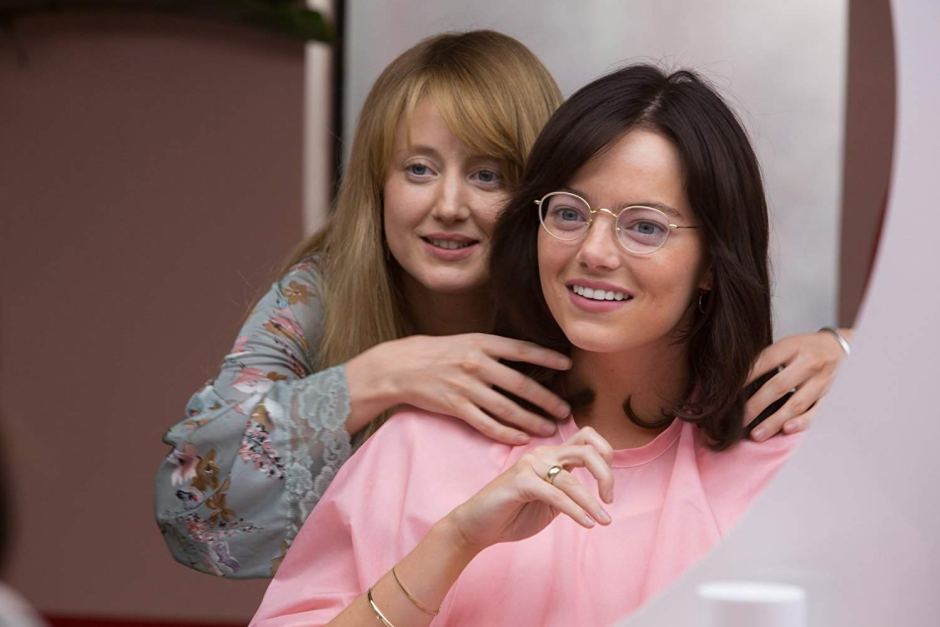 If you accept that you’re being sold a simplified snapshot, Battle of the Sexes is a lot of fun. It has two directors – Valerie Faris and Jonathan Dayton (who made Little Miss Sunshine) – perhaps to prove that, somewhere on this project, the sexes really can collaborate as equals. Of course it's a necessarily rigged story from which no man emerges with much credit. It's hard to give two hoots for Riggs's private anguish. Billie Jean's walk-on husband Larry King (Austin Stowell) is a lantern-jawed dope. Tennis impresario Jack Kramer (Bill Pullman) may as well horns and a curly tail. Even foppish tennis couturier Ted Tinling (Alan Cumming, not quite the full ticket as an English toff) spouts feeble bullet-pointed bromides - “some day we will be free to be who we are” etc.
If you accept that you’re being sold a simplified snapshot, Battle of the Sexes is a lot of fun. It has two directors – Valerie Faris and Jonathan Dayton (who made Little Miss Sunshine) – perhaps to prove that, somewhere on this project, the sexes really can collaborate as equals. Of course it's a necessarily rigged story from which no man emerges with much credit. It's hard to give two hoots for Riggs's private anguish. Billie Jean's walk-on husband Larry King (Austin Stowell) is a lantern-jawed dope. Tennis impresario Jack Kramer (Bill Pullman) may as well horns and a curly tail. Even foppish tennis couturier Ted Tinling (Alan Cumming, not quite the full ticket as an English toff) spouts feeble bullet-pointed bromides - “some day we will be free to be who we are” etc.
There’s an awful image of fellow pro Rosie Casals (Natalie Morales, terrific) talking to camera with a tall patronising commentator clamping his hand round the back of her neck as if she’s his chattel. And spot the briefest cameo for that famous Athena poster of the tennis girl hitching up her skirt to reveal nothing underneath. The bare-faced cheek of male chauvinism needed a damn good slap. This fantasy history administers it lightly, with wit and grace.
Overleaf: watch the trailer to Battle of the Sexes

Breaking up is hard to do, sang Neil Sedaka, and Mercedes Grower plays out that sentiment in a quirky, original and often funny film, which neatly subverts Hollywood romcom tropes.
It's an episodic piece (with a stellar cast) that cuts between nine couples breaking up with resignation or despair, angrily or comically. There's some unbearably honest writing, but also some rather less accomplished scenes that have the feel of improvised material.
And some stories work better than others, but there are a couple that stand out. Julia Davis is wonderful as Livy, a self-obsessed, talent-free actress smarming her way into a role and into the director's bed (Peter Wight, both pictured below) while considering a fling with fellow actor Karl (Seb Cardinal); Elliot (Julian Barratt) is a touchingly innocent man-child swooning over straight actor Raymond (Oliver Maltman) whom he tries to win back by buying him an ice cream.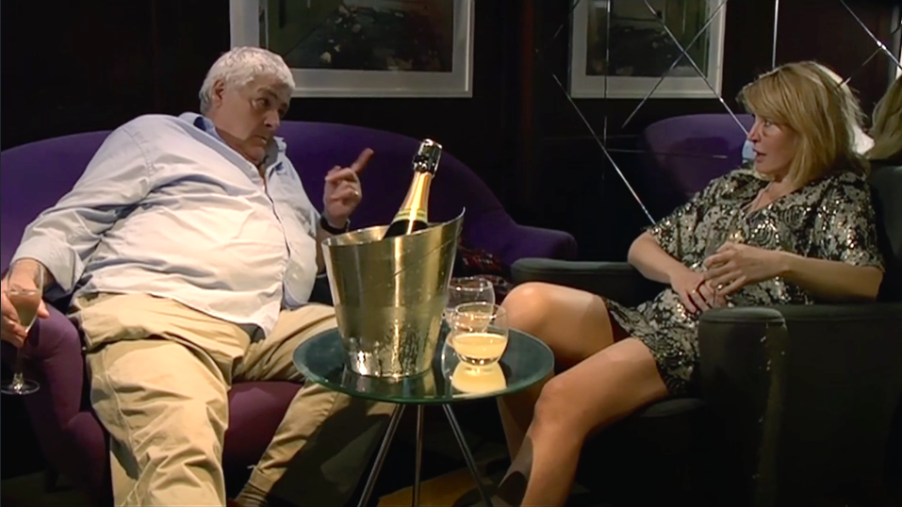 While there's some nice comedy in those episodes, in others there's a dark undertow – such as middle-aged couple (Kerry Fox and Roland Gift), whose marriage won't survive their booze-sodden mutual loathing and resentment; or the break-up between Peter and Susan (Paul McGann and Kate Hardie), who have clearly been at this point in their relationship many times over the years, in that on-off-on-off-again revolving door that so many would recognise.
While there's some nice comedy in those episodes, in others there's a dark undertow – such as middle-aged couple (Kerry Fox and Roland Gift), whose marriage won't survive their booze-sodden mutual loathing and resentment; or the break-up between Peter and Susan (Paul McGann and Kate Hardie), who have clearly been at this point in their relationship many times over the years, in that on-off-on-off-again revolving door that so many would recognise.
Grower herself appears as Layla in the most discomfiting story. Layla is heavily pregnant by Daniel (Noel Fielding), a nasty piece who works in a sex shop and denies he's the father, and spends every moment dribbling a football, which he gives more attention than he does to her.
Despite being made on a tiny budget, 'Brakes' often looks like a love letter to London
In the second half of the film the couples' stories are rewound for a briefer series of scenes where we are told how they got together. We see the fun and laughter of those first encounters – a couple bonding over a mutual interest in books, or a comic misunderstanding at work, or how Daniel's boyish charm, and later drugs, won over Layla, or how Raymond met Elliot when he was on a lad's weekend in Barcelona and somehow ended up back at Elliot's flat
A few stories are difficult to engage with: the posh businesswoman regretting a one-night stand with a builder who turns out to have been stalking her, an artist getting involved with a man who suffers from perpetual ennui, a long-distance couple whose Skype relationship falters with their broadband connection.
Grower – writer, director, actor and producer – shoots London on a handheld camera through the seasons. Despite being made on a tiny budget, Brakes often looks like a love letter to London while offering bleak insights into dysfunctional relationships. It's an accomplished debut.
Overleaf: watch the trailer for Brakes

Icelandic writer-director Gudmundur Arnar Gudmundsson has made an impressive feature debut with this story of crossing the threshold from childhood to young adult experience. Heartstone acutely and empathetically catches the path from innocence to experience of its two 14-year-old protagonists, Thor (Baldur Einarsson) and Kristján (Blær Hinriksson), in which the film’s twin themes, coming of age and coming out, become uneasily intertwined.
Gudmundsson opens his story at a leisurely pace – and, at a few minutes over the two-hour mark, there’s no calling its rhythm hurried – as we discover the world in which the two teenagers live. It’s the summer holidays, and they’re loping around with friends, fishing from the harbour side of the remote village that is home. When a shoal of fish swims by unexpectedly, the kids are soon struggling to pull them out of the water fast enough, before casually bashing them to death on the concrete. It’s an indicator that nature here is coloured by tooth and claw (an allusion referenced literally in one early visual), without overmuch room for sentiment. Such a mood will colour the human development that follows, too. But this is also nature, in the sheer physical sense, at its most impressive (pictured above). The craggy coast around the cluster of houses that makes up the isolated village rises up towards spectacular mountains, which somehow dwarf any human activity with their scale. In summer, as the light stretches around the clock, the beauty is awesome, memorably captured in Norwegian cinematographer Sturla Brandth Grøvlen’s widescreen vistas. But we sense that when winter comes – Heartstone closes as the first dusting of snow falls – the cold isolation of the place will be as complete as the luminous airiness with which it seasonally alternates.
But this is also nature, in the sheer physical sense, at its most impressive (pictured above). The craggy coast around the cluster of houses that makes up the isolated village rises up towards spectacular mountains, which somehow dwarf any human activity with their scale. In summer, as the light stretches around the clock, the beauty is awesome, memorably captured in Norwegian cinematographer Sturla Brandth Grøvlen’s widescreen vistas. But we sense that when winter comes – Heartstone closes as the first dusting of snow falls – the cold isolation of the place will be as complete as the luminous airiness with which it seasonally alternates.
Coming-of-age stories like this, especially from Nordic and Scandinavian climes, are almost a trope of cinema, often defined by the gentleness of their revelations, the sometimes quirky benignity of their settings. Gudmundsson consciously avoids any such tenderness, with nature’s cruelties mirrored in the immediate human environment, like how the village’s older teenagers tease the younger generation. There’s a similarly sharp atmosphere at home, with existence for the sensitive Kristján dominated by a hard-drinking father, and family life for Thor – the nice irony of his name is emphasised by the fact that, though he’s determined and tough, he’s still a minnow in size – coloured by two elder sisters who are as unforgiving with him as they are with their single mother (Nína Dögg Filippusdóttir, a lovely performance).
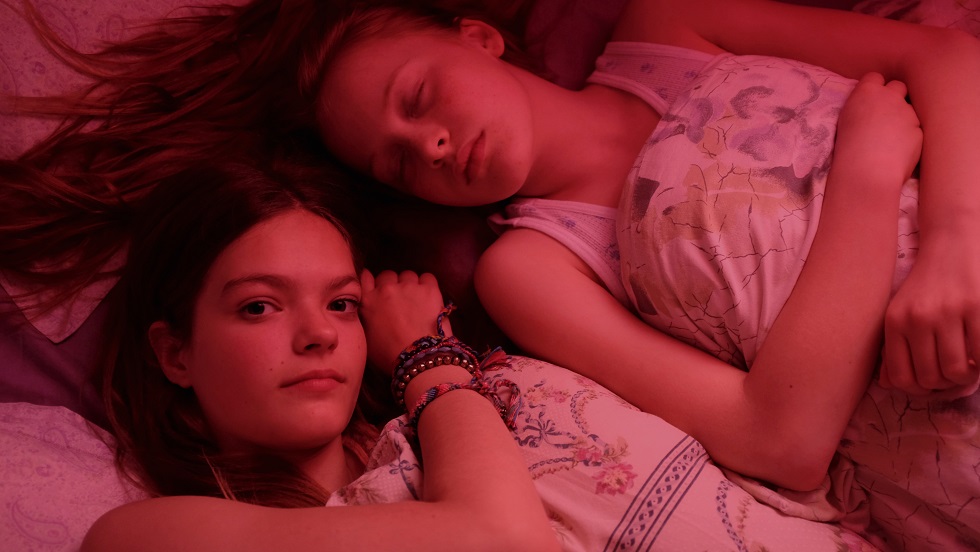 The father has gone off with a younger woman, and any sympathy for their mum's tentative attempts to find someone to date in this backwater is notably lacking. We see what it involves for her when the adults get together for the village-hall dance – a thrash, if ever there was one – and her attention falls on the outsider Sven (Søren Malling, a visitor in every sense: he’s Torben, from Borgen). Nevertheless there’s a sense of tough-love affection in this family unit that is finally reassuring, as well as an element of comedy to the sisters, Hafdis (Ran Ragnarsdottir) particularly; she writes poetry of Plath-like intensity that she reads out at meals.
The father has gone off with a younger woman, and any sympathy for their mum's tentative attempts to find someone to date in this backwater is notably lacking. We see what it involves for her when the adults get together for the village-hall dance – a thrash, if ever there was one – and her attention falls on the outsider Sven (Søren Malling, a visitor in every sense: he’s Torben, from Borgen). Nevertheless there’s a sense of tough-love affection in this family unit that is finally reassuring, as well as an element of comedy to the sisters, Hafdis (Ran Ragnarsdottir) particularly; she writes poetry of Plath-like intensity that she reads out at meals.
Contrasting yet complementary female company comes with Beta (Dilja Valsdotttir) and Hanna (Katla Njalsdottir, pictured together above), with whom the boys tentatively explore the first hints of sexual consciousness at furtive sleepovers, which come with games of Truth or Dare, the forfeits precipitating different kinds of intimacy. Gradually the unsuspecting best-friend closeness between Thor and Kristján becomes something more complicated, though the scenes of revelation are laced with a lightness that allows for it all to be treated as game-playing. The ramifications become clearer in an episode in which the four of them go camping on their own in the mountains, where the landscape itself seems to pull a response from Kristján that he somehow can’t resist.
Gudmundsson treats the repercussions of his story with understated sensitivity: Heartstone may have won the “Queer Lion” at last year’s Venice film festival, but the sexuality here is one of exploration rather than action (Céline Sciamma’s Tomboy is one other such film that comes to mind). In all such tales of the growing self-awareness of youth, the quality of the playing from the young cast is crucial, and Gudmundsson has drawn hugely sensitive performances from his two leads. The landscapes that surround them may be monumental and memorable, but the sincerity and naturalness of these two performances is almost microscopically exact.
Overleaf: watch the trailer for Heartstone

Screen biographies are tricky things to pull off when the person portrayed has left behind an indelible screen presence. It was hard to love Michelle Williams dragging up for My Week with Marilyn; Grace of Monaco was Nicole Kidman refracted through the eyes of Madame Tussaud. But Annette Bening is wholly mesmerising in her reincarnation of Gloria Grahame, the Oscar-winning femme fatale who became a jobbing actress in late 1970s England.
Film Stars Don't Die in Liverpool is based on actor Peter Turner’s slim, self-deprecating memoir of his love affair with Grahame, first published in 1986 some five years after her death. Turner met the film noir legend when they both rented rooms in a London boarding house in 1979. Despite being at least a generation older than him, they fell in love and their romance lasted two years, stretching from New York to LA before ending in Liverpool in his parents’ house.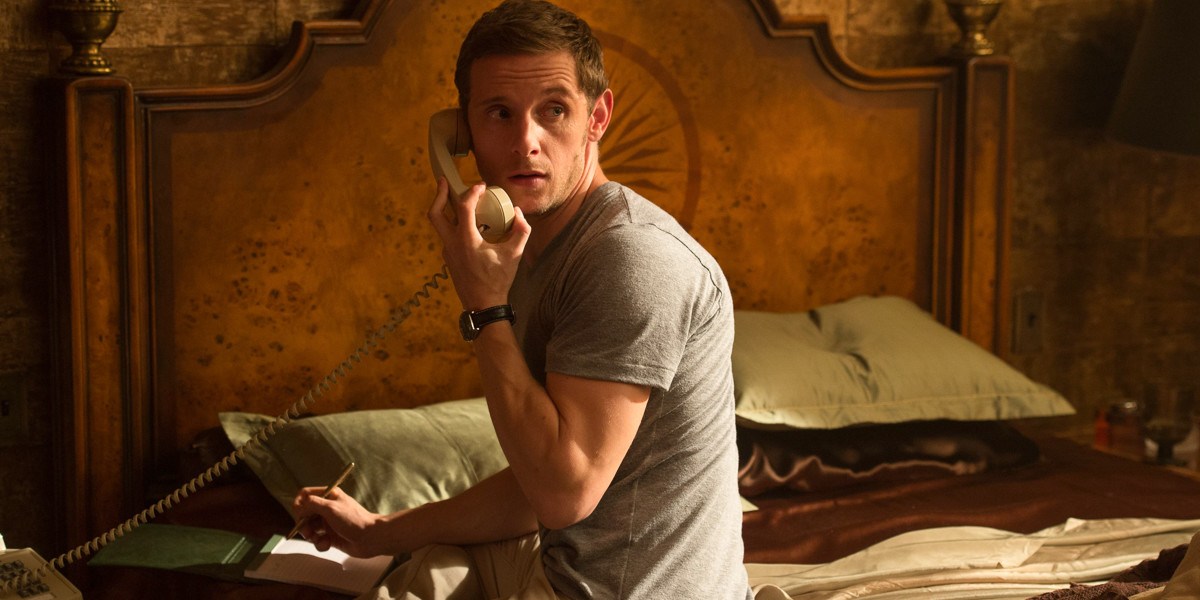 Jamie Bell (pictured above) is charming as the young Turner, a compliant beau with a kind heart, wide shoulders and neat footwork. They meet cute when he channels Tony Manero to help Grahame practise the hustle. It’s fun to see that Billy Elliot still has the moves but it is Bening’s shimmy that breaks your heart. This is her movie and it's aimed at the Academy. She captures Grahame’s breathy voice and sharp wit perfectly; her pleasure in her young lover is clear, as is her wistfulness for the classical stage career she never had. Bening doesn't dodge the lens which highlights her own ageing face and gives a superbly brave performance. I found myself scurrying back to The Grifters, the neo-noir she made in her twenties, where she plays exactly the kind of playful moll that Grahame trademarked in the 1950s.
Jamie Bell (pictured above) is charming as the young Turner, a compliant beau with a kind heart, wide shoulders and neat footwork. They meet cute when he channels Tony Manero to help Grahame practise the hustle. It’s fun to see that Billy Elliot still has the moves but it is Bening’s shimmy that breaks your heart. This is her movie and it's aimed at the Academy. She captures Grahame’s breathy voice and sharp wit perfectly; her pleasure in her young lover is clear, as is her wistfulness for the classical stage career she never had. Bening doesn't dodge the lens which highlights her own ageing face and gives a superbly brave performance. I found myself scurrying back to The Grifters, the neo-noir she made in her twenties, where she plays exactly the kind of playful moll that Grahame trademarked in the 1950s.
Director Paul McGuigan, collaborating with the gifted cinematographer Ula Pontikos, pulls off some real cinema magic. They use what looks like Fifites style back projection and fluid camera moves to convey the lovers' golden time in America (pictured below), although the whole film was actually shot in the UK. But it falls down somewhat in the art department. The interior scenes are suffocating with their near-obsessive period detail – patterned wallpaper, nightmarish carpeting and painfully bad wigs for Julie Walters as Peter’s warm-hearted mum and Stephen Graham as his grumpy brother.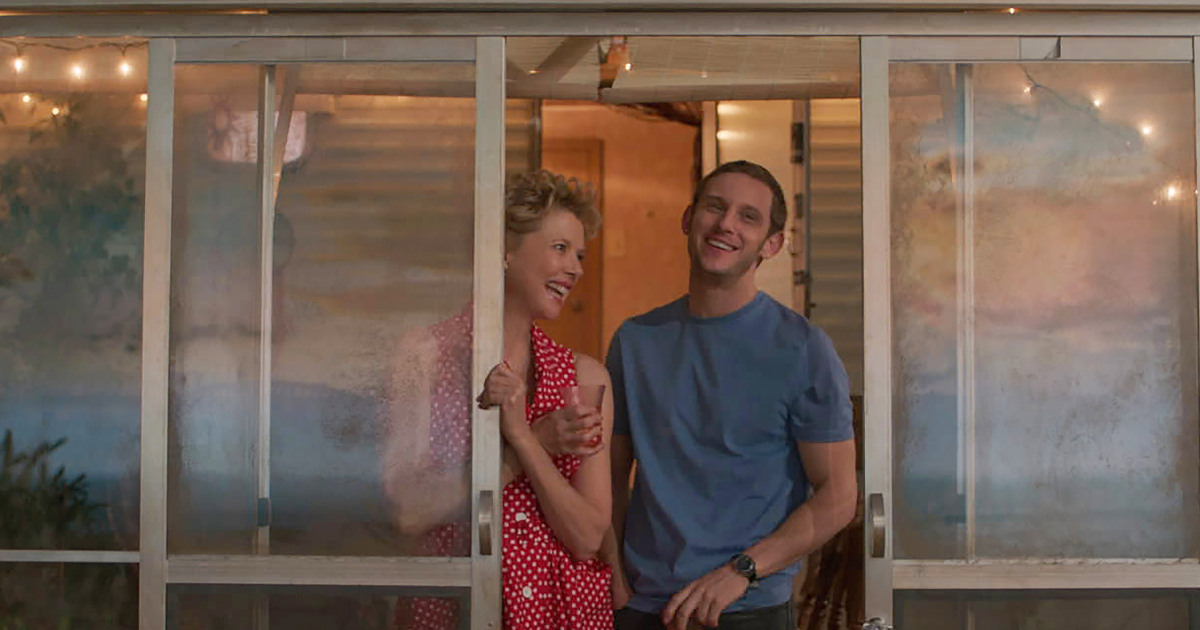 Too many scenes in the kitchen in Liverpool threaten to sink the film into kitchen sink realism; Walters overdoes the loveable tolerant mum act. While I was grateful that there weren’t too many chunks of clunky exposition shoe-horning Grahame’s scandalous marital history into the dialogue, the script is oddly vague about Grahame's romantic history and its repercussions. She had four husbands, including the great director Nicholas Ray with whom she had a son; their marriage ended when she was found in bed with Ray's 13-year old son, Tony. She went on to marry Tony Ray some years later and have two more children with him. The ensuing scandal made it more than a little hard for her to work in Hollywood and she came to England to work in theatre and TV.
Too many scenes in the kitchen in Liverpool threaten to sink the film into kitchen sink realism; Walters overdoes the loveable tolerant mum act. While I was grateful that there weren’t too many chunks of clunky exposition shoe-horning Grahame’s scandalous marital history into the dialogue, the script is oddly vague about Grahame's romantic history and its repercussions. She had four husbands, including the great director Nicholas Ray with whom she had a son; their marriage ended when she was found in bed with Ray's 13-year old son, Tony. She went on to marry Tony Ray some years later and have two more children with him. The ensuing scandal made it more than a little hard for her to work in Hollywood and she came to England to work in theatre and TV.
In one bravura scene, Vanessa Redgrave (playing Grahame's mother) and Frances Barber (her spikey sister) meet Peter in Grahame's beachside trailer home. They interrogate him over an awkward dinner in the bijou love nest. Disapproval of their relationship hums in the air. Grahame refers to being a mother herself, and there's a brief glimpse of a son at the very end, but it does feel as if a significant aspect of her life has been unexplored, perhaps due to the sensitivities of her surviving children.
Films Stars Don’t Die in Liverpool is ambitious in its structure (time frames shift in a fluid camera move) so the lack of a subtler script is a disappointment. But if it makes a new generation go in search of Gloria Grahame’s back catalogue (In a Lonely Place is a great place to start) and wins Bening a well-deserved Oscar, it'll be worth it.
Overleaf: watch the trailer for Film Stars Don't Die in Liverpool

This is not a movie to see in the front row – intrusive close-ups, hand-held camerawork, colour saturated night shots and a relentless synthesiser score all conspire to make Good Time a wild ride. An unrecognisable Robert Pattinson plays Connie Nikas, a nervy con artist who enlists his intellectually disabled brother Nick in a bank robbery. The heist goes horribly wrong and the camera clings to the brothers and their nightmarish fate over the next 24 hours. Directed by real-life brothers Josh and Benny Safdie (the latter also plays Nick), Good Time sometimes plays like an extended homage to the early films of Martin Scorsese, Michael Mann and Abel Ferrara.
There’s a touch too of Dog Day Afternoon, particularly in the role of Nick. I’m always wary when able actors "play crip": it’s tantamount to blackface and shouldn’t be necessary when there are plenty of talented disabled performers. But in this case the amount of violence and degradation inflicted on the character of Nick would make it hard for a director to ask an actor with intellectual disabilities to endure without accusations of exploitation.
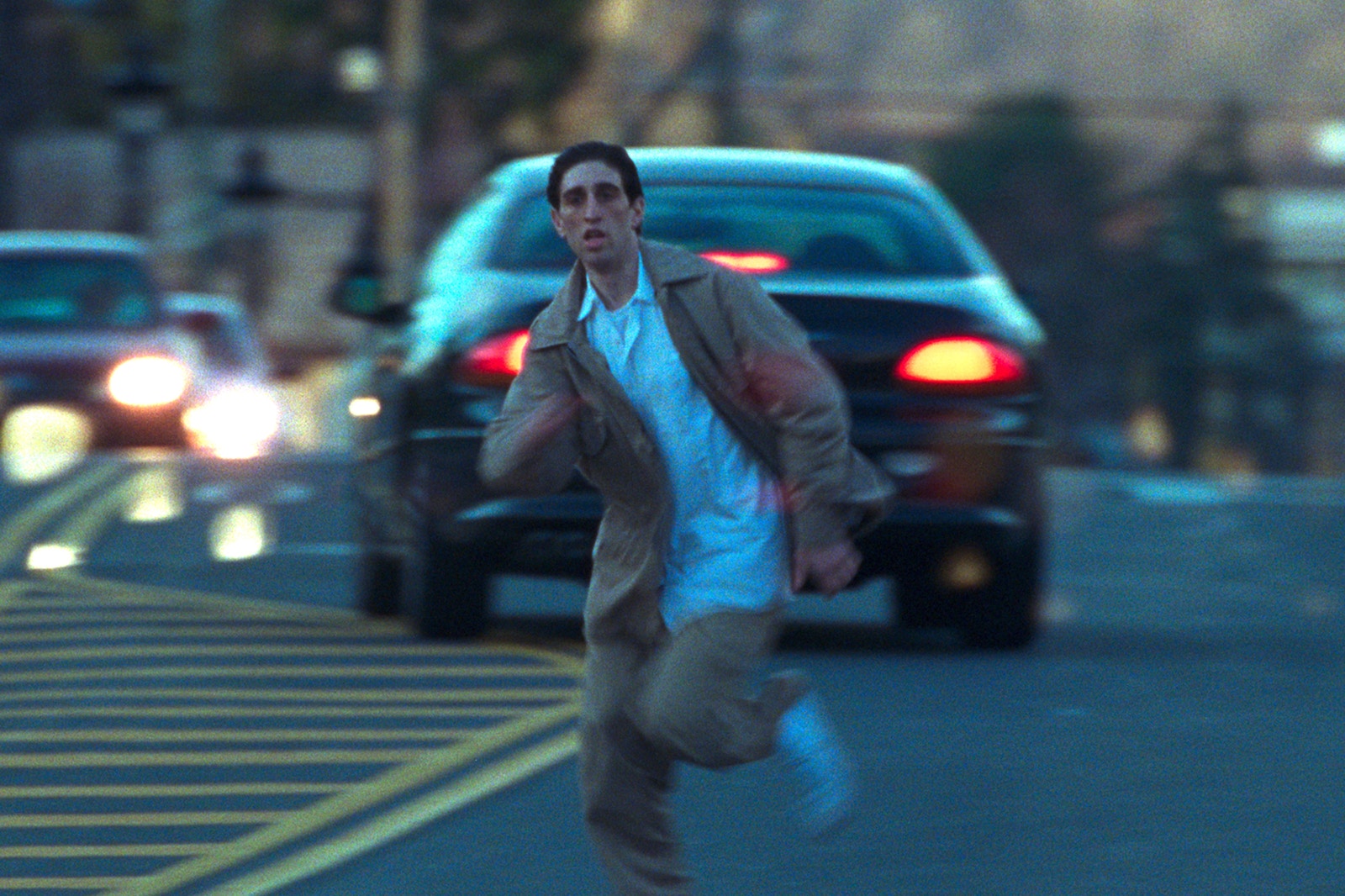 Casting major actors like Robert Pattinson and Jennifer Jason Leigh as his train-wreck girlfriend is a significant step up from the Safdies’ previous film. Heaven Knows What (2014) featured unknown non-professionals as actors playing versions of themselves, homeless heroin addicts trying to get their next fix. Buddy Duress (pictured above) was one of the Safdies' street discoveries and he gets a key role in Good Time.
Casting major actors like Robert Pattinson and Jennifer Jason Leigh as his train-wreck girlfriend is a significant step up from the Safdies’ previous film. Heaven Knows What (2014) featured unknown non-professionals as actors playing versions of themselves, homeless heroin addicts trying to get their next fix. Buddy Duress (pictured above) was one of the Safdies' street discoveries and he gets a key role in Good Time.
Having done time himself, Duress is wholly convincing as the chaotic Ray, another desperate chancer caught up in Connie’s machinations. Ray has had his face bashed up in a drug deal gone wrong; he looks like a Francis Bacon portrait made flesh. There’s a cameo too from Barkhad Abdi (Oscar-nominated for Captain Phillips) that obliquely highlights the institutional racism of the NYPD.
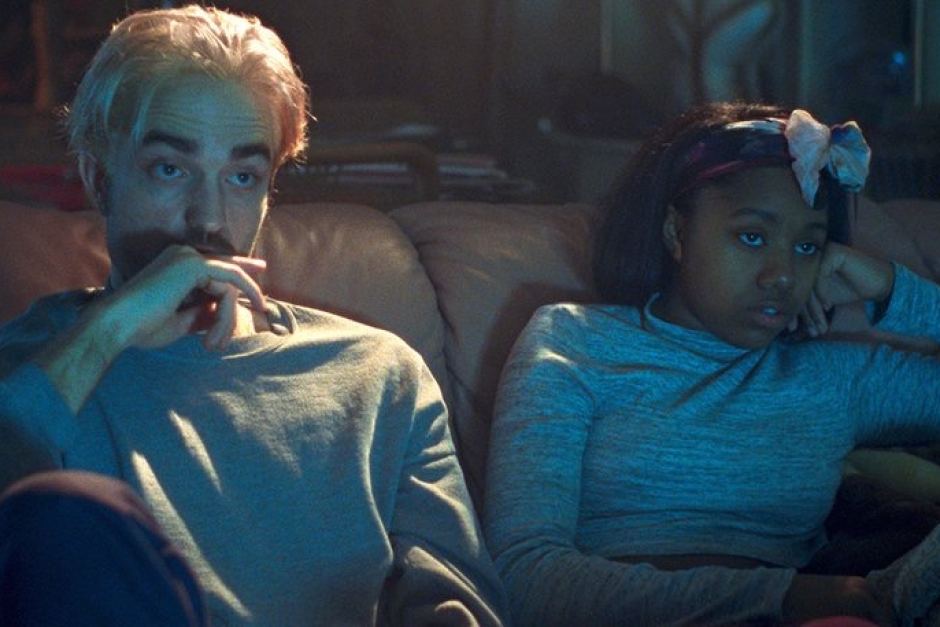 But it’s getting a big star like Robert Pattinson and giving him a dark, meaty role that has amply paid off here. By this point, he's well and truly escaped from the languid vampire of the Twilight films. Connie is a superbly ambiguous character. Is he just an opportunistic thug duping everyone around him, or is he genuinely protective of his disabled brother? Good Time would make an interesting double bill with Rain Man, another tale of brotherly exploitation with a major star choosing to play against type. But unlike Rain Man, there’s very little moral redemption in the Safdies’ nightmarish vision especially in the third act, which includes the ruthless manipulation of an underage girl (Talia Webster, pictured above with Pattinson). All neon and nastiness, Good Time is both exhausting and exhilarating.
But it’s getting a big star like Robert Pattinson and giving him a dark, meaty role that has amply paid off here. By this point, he's well and truly escaped from the languid vampire of the Twilight films. Connie is a superbly ambiguous character. Is he just an opportunistic thug duping everyone around him, or is he genuinely protective of his disabled brother? Good Time would make an interesting double bill with Rain Man, another tale of brotherly exploitation with a major star choosing to play against type. But unlike Rain Man, there’s very little moral redemption in the Safdies’ nightmarish vision especially in the third act, which includes the ruthless manipulation of an underage girl (Talia Webster, pictured above with Pattinson). All neon and nastiness, Good Time is both exhausting and exhilarating.
Overleaf: watch the trailer for Good Time


Wonder Woman was the film that defied all the predictions: a big-budget superhero movie directed by a woman which managed to please not only the feminists and their daughters but also the boys who love DC and Marvel. In its slipstream comes Professor Marston and the Wonderwomen, written and directed by Angela Robinson, best known for her work in TV on The L Word. It's surrounded by some controversy as it claims to be a based on a true story but there's not a lot of corroborative testimony from the central characters to justify its narrative.
It’s the tale of Harvard psychology professor William Moulton Marston (Luke Evans), who together with his brilliant, spiky wife Elizabeth (Rebecca Hall) designed a prototype lie-detector machine in the 1930s. We meet him lecturing and flirting with his all-girl class on his theory that male-female relations are based on dominance and submission. His argument is that women should play more of a dominant role upon occasion in order for the mental health of both sexes to thrive (Hall and Evans pictured below).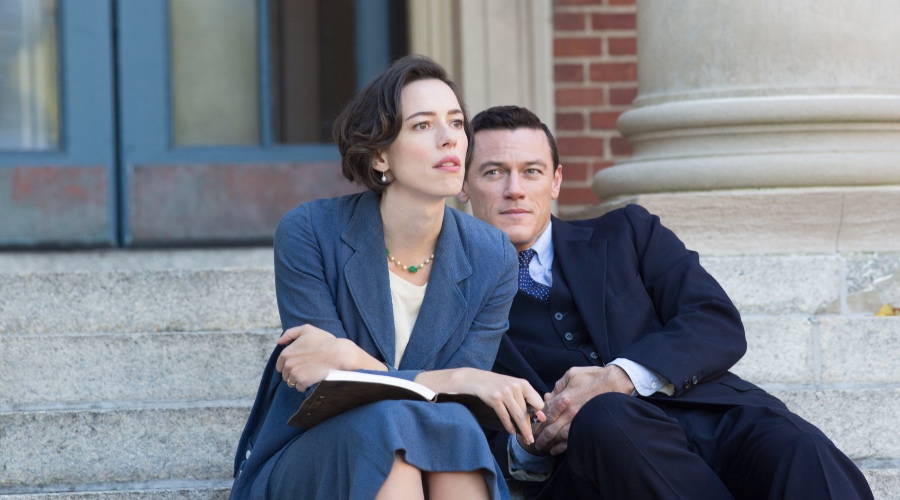 Watching his bravura performance at the lectern throughout is his wife, but Marston's eye is particularly drawn to Olive (Bella Heathcote), a student whose doll-like prettiness (and an aunt and mother who are pioneer feminists) intrigues him. His desire for Olive is briefly thwarted when she demonstrates that she’s more interested in snogging his wife than him, but they soon settle into a scandalous sexy threesome and Marston is forced to leave the university.
Watching his bravura performance at the lectern throughout is his wife, but Marston's eye is particularly drawn to Olive (Bella Heathcote), a student whose doll-like prettiness (and an aunt and mother who are pioneer feminists) intrigues him. His desire for Olive is briefly thwarted when she demonstrates that she’s more interested in snogging his wife than him, but they soon settle into a scandalous sexy threesome and Marston is forced to leave the university.
Churning out pop psychology articles doesn’t really pay their household bills or promulgate his theory, so Marston turns to comic book creations and launches Wonder Woman on the world with the help of DC Comics. The kinky costume and barely concealed bondage and spanking themes that run regularly through Marston's comic strips see him hauled up in front of a decency committee while his home life (he had children with both women) causes local scandal.
Angela Robinson has bathed the entire film with a nostalgic glow
Writer-director Angela Robinson cuts back and forth between scenes of Marston being interrogated by a decency committee and the three-way romance. It's a rather clunky narrative device. She has bathed the entire film with a nostalgic glow reminiscent not of the actual 1940s but of a 1990s Armani advertising version of the era. The much-hyped sex scenes are so wholesome as to be almost farcical.
Cutting through this schmaltz is a laser-like performance from Rebecca Hall, whose intelligence and line delivery is entertaining if anachronistic. Did women in that era, no matter how smart, really say things like, "When are you going to stop justifiying the whims of your cock with science?" Or describe someone as a "Grade A bitch"? Hall makes the other two players in her ménage à trois look like Ken and Barbie dolls; her performance just about saves the film, but it's a bit of a wasted opportunity to tell what was a remarkable story. The end credits contain a moving sequence of photographs of the two real-life women, who carried on living together for decades after Marston's death.
Overleaf: watch the official trailer for Professor Marston and The Wonderwomen

